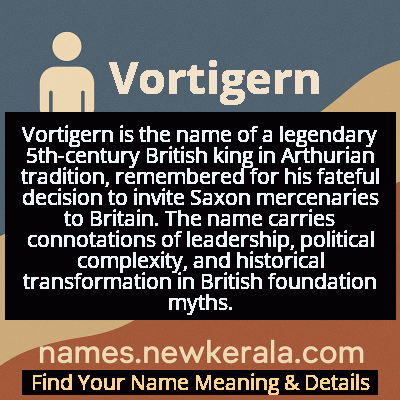Vortigern Name Meaning & Details
Origin, Popularity, Numerology Analysis & Name Meaning of Vortigern
Discover the origin, meaning, and cultural significance of the name VORTIGERN. Delve into its historical roots and explore the lasting impact it has had on communities and traditions.
Name
Vortigern
Gender
Male
Origin
Arthurian
Lucky Number
2
Meaning of the Name - Vortigern
Vortigern is the name of a legendary 5th-century British king in Arthurian tradition, remembered for his fateful decision to invite Saxon mercenaries to Britain. The name carries connotations of leadership, political complexity, and historical transformation in British foundation myths.
Vortigern - Complete Numerology Analysis
Your Numerology Number
Based on Pythagorean Numerology System
Ruling Planet
Moon
Positive Nature
Diplomatic, friendly, artistic, empathetic.
Negative Traits
Over-sensitive, moody, indecisive, prone to self-pity.
Lucky Colours
Green, cream, white.
Lucky Days
Monday.
Lucky Stones
Pearl, moonstone.
Harmony Numbers
1, 3, 4.
Best Suited Professions
Diplomats, mediators, caregivers, artists.
What People Like About You
Cooperative spirit, friendliness, artistic talent.
Famous People Named Vortigern
Vortigern
Legendary British King
Ruled Britain during transition from Roman to Saxon rule; invited Saxon mercenaries to Britain
Vortigern (Historical Figure)
British Warlord
Led British resistance against Pictish and Scottish invasions in post-Roman Britain
Vortigern of Powys
Welsh King
Appears in Welsh genealogies as ancestor of royal lines in medieval Wales
Name Variations & International Equivalents
Click on blue names to explore their detailed meanings. Gray names with will be available soon.
Cultural & Historical Significance
Extended Personality Analysis
Vortigern's personality as depicted in historical and legendary sources presents a complex portrait of a leader under extreme pressure. He is typically characterized as politically savvy and decisive, capable of uniting British factions against common enemies, yet fundamentally flawed in his strategic judgment. His most defining trait is his pragmatism—when faced with overwhelming threats from multiple directions, he chooses what appears to be the most practical solution by employing Saxon mercenaries, demonstrating both innovative thinking and desperate measures. However, this pragmatism crosses into shortsightedness when he fails to anticipate the long-term consequences of his actions. Later medieval romances often amplify his negative qualities, portraying him as power-hungry, manipulative, and willing to sacrifice long-term stability for immediate security. This evolution in his characterization reflects changing medieval attitudes toward leadership and the moral lessons writers sought to draw from Britain's foundational myths.
Modern Usage & Popularity
In contemporary times, the name Vortigern remains exceptionally rare and is primarily confined to academic circles, historical fiction, and enthusiasts of Arthurian legend. It has never gained popularity as a given name in English-speaking countries, largely due to its strong association with a controversial historical figure blamed for the Saxon conquest. However, it sees occasional use in fantasy literature, role-playing games, and historical reenactment communities where its archaic and powerful sound appeals to those seeking authentic British mythological names. The Welsh form 'Gwrtheyrn' appears slightly more frequently in Wales, though still very uncommon. The name's usage is almost exclusively symbolic or artistic rather than practical, serving more as a historical reference or literary device than as a personal identifier in modern society.
Symbolic & Spiritual Meanings
Symbolically, Vortigern represents the archetype of the flawed leader whose reasonable decisions under pressure lead to catastrophic unintended consequences. He embodies the tension between short-term pragmatism and long-term vision in governance, serving as a perpetual warning about the dangers of desperate measures. His story symbolizes the painful transition between historical eras—the end of Roman Britain and the beginning of Anglo-Saxon England—making him a figure of transformation and cultural shift. In metaphorical terms, he represents the moment when external help becomes domination, when temporary solutions become permanent problems, and when well-intentioned compromises lead to irreversible change. His legacy serves as a complex symbol of political responsibility, the weight of leadership decisions, and the unpredictable nature of historical causation.

